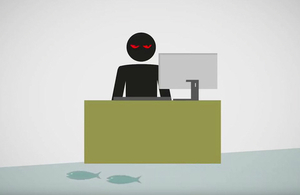Warning as fraudsters target students' final loan instalments
The Student Loans Company (SLC) is warning all students to be on their guard against fraudsters.

(" ")
Fraudsters often target students with bogus emails and SMS around the three loan instalment periods in September, January and April each year.
Fiona Innes, Head of Counter Fraud Services at the Student Loans Company, said:
“We want to remind customers that we will never request a customer’s personal or banking details by email or text message.
“Anyone who receives a scam email about student finance should send it to us at phishing@slc.co.uk, as this allows us to close the site down and stop students from being caught out.
“Online fraudsters are aware that students are receiving their next instalment soon and may target them and their sponsors with emails and texts requesting personal and banking details to access their finance.
“We want to remind students and their sponsors to stay vigilant with the details they provide online and to be mindful of the personal information about themselves they post online and on social media too.”
The Student Loans Company administers student finance on behalf of the Government and devolved administrations across the UK. In the last two years, SLC’s Counter Fraud Services team stopped over half a million pounds of student funding being stolen through phishing scams and in the last financial year alone, the team prevented £13.2 million of taxpayers’ money from being paid out by identifying fraudulent activity.
Spotting a phishing email isn’t always easy but the Student Loans Company has five fraud facts to help:
• Be suspicious of any requests for personal or financial information. SLC or Student Finance England (SFE) will never ask you to confirm your bank details or login information by email.
• Phishing emails are often sent in bulk and are unlikely to contain both your first and last name; they commonly start, ‘Dear Student’.
• Check the quality of the communication - misspelling, poor punctuation and bad grammar are often tell-tale signs of phishing.
• ‘Failure to respond in 24 hours will result in your account being closed’ these types of messages are designed to convey a sense of urgency to prompt a quick response.
• Anyone who receives a suspicious email they think may be a scam should send it to phishing@slc.co.uk. SLC can investigate the site and ensure it is shut down, to help protect other students.
To find out more about Staying Safe Online watch the What is Phishing? video.
For further information please contact:
Media Enquiries
For out of hours enquiries, please contact 0141 306 2120 in the first instance.